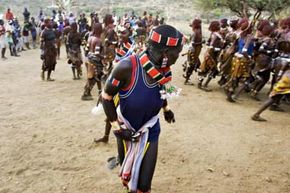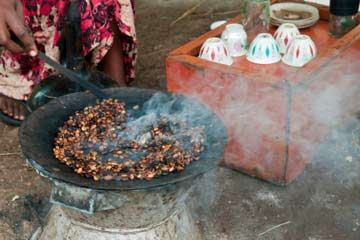Traditional Ethiopian Family and Cultural Celebrations
The country's notable annual celebrations are religious holidays, particularly those celebrated by the majority Orthodox Christians. Ganna, the Ethiopian Christmas, is celebrated on Jan. 7. People fast the day before, and on the following morning they awaken at dawn for early mass, which they attend clad in white shammas.
The choir assembles in the outer circle of the church, and each person who enters is given a candle. The congregation walks around the church three times in a solemn procession, holding the candles. They then gather in the second circle to stand throughout the long mass, with the men and boys separated from the women and girls. The center circle is the holiest space in the church, where the priest serves Holy Communion.
Advertisement
On Jan. 19, Ethiopians begin Timkat, the three-day celebration commemorating Christ's baptism. Wearing crowns and robes designating different youth groups, children walk to church services in a procession. Adults dust of their shammas,while the priests wear red and white robes and carry embroidered fringed umbrellas [source: TLC].
For Ethiopia's many Muslim inhabitants, the holy month of Ramadan is marked with fasting and prayer. This, of course, creates quite the appetite. The greatest Muslim feast of the year is Id Al Fatr, which celebrates the end of Ramadan. Another important Muslim feast is the Id al Adha, during which followers sacrifice animals and distribute part of the meat to the poor [source: Selamta].
Ethiopian weddings are also dictated by religious traditions, but certain aspects are generally uniform throughout the country. For example, weddings are often large, all-day events, preparations for which begin months in advance. On the wedding day, relatives and guests assemble at the bride and groom's homes. After the groom dresses for the wedding and is blessed by his relatives, he goes to the bride's home to accompany her to the ceremony [source: 2020 Ethiopian Tours].
No celebration is complete without music. Take a look at the next page for some of the tunes that provide the soundtrack to life in Ethiopia.



